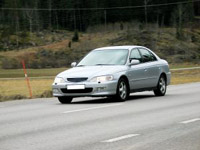Driving in Costa Rica is considerably different from driving the US and the UK – the roads are not particularly well-developed, and people have a tendency to treat the traffic rules very lightly, which can be unnerving for an expat. Most people in Costa Rica don’t own a private vehicle because of how expensive cars are. Moreover, the Public Transport system in the cities is fairly good, and a majority of the local population travels by buses. It is mainly people living in remote areas who find it necessary to travel by car. Many tourists and expats who need cars prefer renting to buying one. The minimum age for driving in this country is 18 years. However, the minimum age for renting a car is 23 years (and 25 years in some places).Americans expats may find it somewhat easier to drive in Costa Rica, as the steering wheel is on the left side of the car and people drive on the right side of the road.
Given below are a few tips that could help make driving a more pleasant experience for expats who decide to drive in Costa Rica:
1. Obtain a valid driver’s license:
If you are from the US or the UK, you can use a driver’s license issued in your home country for up to three months in Costa Rica. Nationals from other countries should get an International Driving Permit, which can be used for the same duration.
After the 3-month period is up (and once you receive your residency) you’ll need to apply for a local license to continue driving. This can be done at the Ministerio de Obras Publicas y Transportes (MOPT) by showing your passport, original driver’s license and cedula. A basic medical and vision exam is mandatory, but you won’t have to give a driving test again as long as your previous license is still valid.
Initially, your license is valid for two years and must be renewed if you want to continue driving. After renewal, your license will be valid for another five years. In case you are aged 65 or above, you need to renew your license once a year.
2. Stay within the speed limit
Costa Rica has several different types of roads, such highways, motorways, toll roads and urban roads; the speed restrictions for each vary.
Though all roads are supposed to carry signposts with their speed limits, this is not always the case. National speed restrictions generally observed include: highways – 90 Km/h; urban roads – 40 Km/h; inner city roads – 20 Km/h; and single-lane carriageways – 60 Km/h. The speed limit for roads in front of schools and medical facilities is 25 Km/h. The motorways usually have a minimum (40 Km/h) and maximum (100 Km/h) speed restriction.
Anyone caught driving at a speed of 120 Km/h or more is fined heavily. Driving at a speed of 150 Km/h can also result in some prison time.
3. Follow all the rules and regulations
The traffic rules in Costa Rica are similar to those enforced in the US and the UK. Wearing a seatbelt is compulsory for the driver as well as all the passengers in the car. In case you have a young child in the car, do ensure that he or she is safely strapped into a car seat. Some common traffic offenses to avoid include:
• Talking on a cell phone while driving
• Making an illegal turn
• Overtaking from the right
• Failing to use the correct indicators/signals
• Tailgating or driving too close to the car ahead
• Driving under the influence of drugs or alcohol
Ensure that your car is always equipped with a kit that includes: a fire extinguisher, reflecting triangles, jumper cables, rope, a jack and a reflecting vest.
4. Get Global Positioning System (GPS)
The roads in Costa Rica are complex. Very often, street signs are missing or outdated. To avoid getting lost, it is best to add a GPS device to your car. Car rental companies often provide a GPS unit for a deposit of around US$ 450. The rent per day is about US$ 10 to US$ 15. Alternately, you could purchase a device yourself and get it installed in your car.
5. Be careful
The crime rate in Costa Rica is relatively high, and therefore it is best to be cautious, even when you’re driving. For example, avoid leaving any valuables in plain view and keep your windows up as much as possible, especially if you are at a traffic light or are stuck in slow-moving traffic. Also, always try to park your car in a safe, secure and well-lit place.
Vehicle insurance is compulsory in Costa Rica. Look around for a good insurance policy for your car as soon as you purchase or rent one. In case of a road accident, call the police and your insurance agent immediately. Don’t move your car unless the police ask you to do so.

